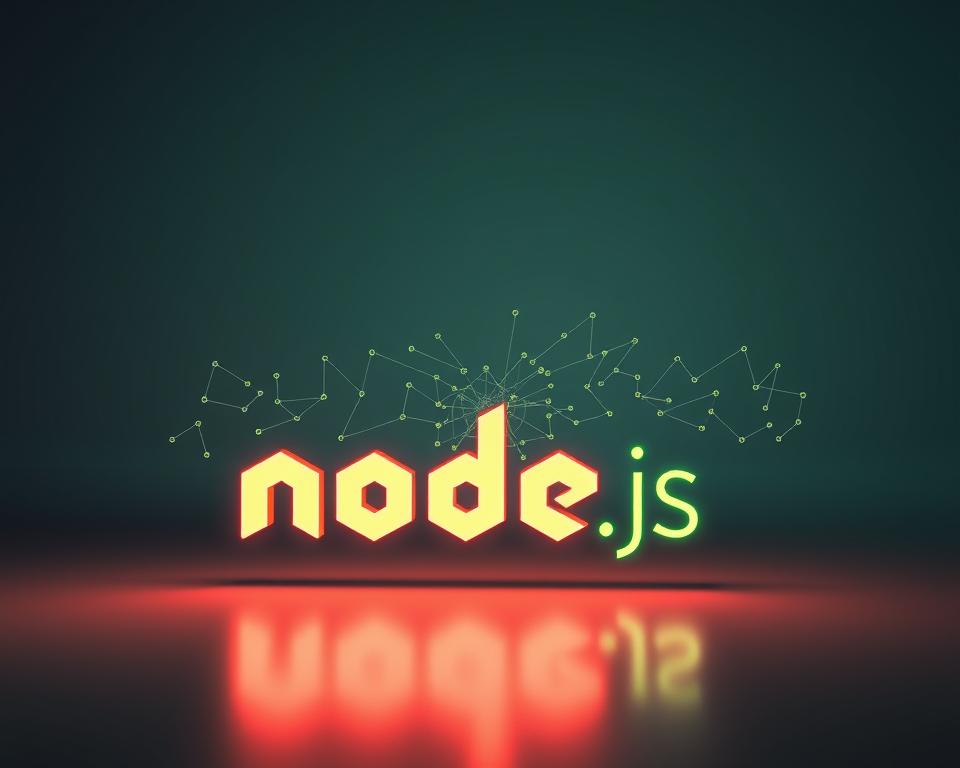Starting a career in Node.js can be lucrative and rewarding for freshers in India. The demand for web apps that scale well is growing. This means more jobs for skilled Node.js developers.
To do well in this field, freshers must learn the right skills. This guide will cover what you need to know. It will also look at job opportunities in India.
Key Takeaways
- Understanding the current job market for Node.js professionals in India
- Identifying the essential skills required for entry-level Node.js developer jobs
- Learning how to build a strong foundation in Node.js development
- Exploring job opportunities and career growth prospects
- Discovering the qualifications and certifications that can boost your career
Understanding Node.js and Its Growing Importance in the Tech Industry
Node.js is becoming more popular with developers. It uses an event-driven, non-blocking I/O model. This makes it great for creating fast and scalable apps.

What is Node.js and How Does It Work?
Node.js lets developers use JavaScript on the server side. It makes web pages dynamic before they reach the user’s browser. Its design is perfect for real-time web apps.
The main features of Node.js are:
- Fast and efficient: Built on Chrome’s V8 JavaScript engine.
- Event-driven: Handles many connections at once.
- Scalable: Great for big applications.
A report by Stack Overflow shows Node.js is a top tech choice for developers.
The Rising Demand for Node.js Developers in India
In India, the need for Node.js developers is growing fast. Top tech companies are using Node.js more.
“The future of web development is heavily reliant on technologies like Node.js,”
.
| Industry Sector | Demand for Node.js Developers |
|---|---|
| Fintech | High |
| E-commerce | Moderate |
| Healthcare | Increasing |
Node.js is in demand because it’s good at handling real-time data. It’s also scalable, which is why companies want it for their web apps.
Current Job Market Overview for Nodejs Developer Jobs Freshers in India
Node.js is key in India’s tech world, boosting job chances. It’s in demand across many fields. This makes it a great time for newbies to start their careers.
Industry Sectors Hiring Node.js Developers
Many sectors in India want Node.js developers. These include:
- Finance and Banking: They use Node.js for quick transactions and safe data.
- E-commerce: It helps build fast and strong online shops.
- Healthcare: Node.js is used for patient data and telehealth services.
- Technology Startups: Startups love Node.js for its quick development and flexibility.

Growth Projections and Future Outlook
The future is bright for Node.js developers in India. The demand is set to soar in the coming years. This is because more companies are going digital and need efficient backend systems.
Several factors are driving this growth:
- Increasing Adoption of Microservices Architecture: Node.js fits well with microservices, making it a top choice.
- Rise of Real-time Applications: Node.js is great for making apps that update instantly, which are getting more popular.
- Expansion of IoT: Node.js is used in IoT for handling lots of connections at once.
Types of Entry-Level Positions Available
Freshers can find many entry-level jobs in Node.js. These include:
- Junior Node.js Developer
- Software Engineer (Node.js)
- Technical Associate (Backend Development)
These roles are perfect for starting a Node.js career. With the right skills, newbies can land these jobs and start their professional journey.
Essential Skills Required for Entry-Level Node.js Developers
To get a Node.js developer job, you need the right skills. Technical skills are key, but soft skills make you stand out.
Technical Skills You Must Master
Technical skills are the foundation of a Node.js developer’s career. Freshers should learn the following areas well:
JavaScript Fundamentals
Knowing JavaScript well is essential. You need to understand variables, data types, and functions. JavaScript is the core language used in Node.js development, so being good at it is a must.
Node.js Core Concepts
It’s important to know Node.js basics like modules and npm. Knowing frameworks like Express.js is also helpful.
Database Knowledge
Knowing databases, like SQL and NoSQL, is key. You should know how to use Node.js with databases. MongoDB and MySQL are favourites among developers.
Version Control Systems
Knowing Git is vital for managing code and working with others.
Soft Skills That Make You Stand Out
While technical skills are important, soft skills are just as vital. They include:
- Teamwork and collaboration
- Effective communication
- Problem-solving abilities
- Adaptability and continuous learning
Working on these soft skills can really help your career in Node.js development.
Educational Qualifications and Certifications That Matter
To start a career in Node.js development, knowing about education and certifications is key. For newcomers, the right education can really help get a job.
Degree Requirements: What Employers Look For
Employers want candidates with a bachelor’s degree in Computer Science or similar fields. This education gives a strong base in programming and software development. A degree shows you’re serious about your career.
Valuable Node.js Certifications for Freshers
Getting Node.js certifications is also a big plus. Certs like the Node.js Developer Certification prove your skills. They show you’re dedicated and skilled to employers. Certified people are often chosen for their ability to tackle tough projects.
Some top certifications are:
- Node.js Developer Certification
- Certified Node.js Developer
- Professional certifications from tech companies
By aiming for the right education and certifications, newcomers can boost their job chances in Node.js.
Building a Strong Foundation in Node.js Development
Starting out in Node.js means learning its basics, doing projects, and setting up your workspace. This is key to getting a job in tech.
Core Concepts Every Node.js Developer Should Know
Node.js uses JavaScript and is all about being fast with many tasks at once. Asynchronous programming lets it handle lots of requests quickly, perfect for live apps.
Some main ideas include:
- Learning about callbacks in Node.js
- Getting to know promises and async/await for async tasks
- Understanding Node.js modules and how to work with them
- Knowing about event-driven programming and the EventEmitter class
Practical Projects to Build Your Skills
Doing real projects is vital to get better at Node.js. Start with easy ones like a RESTful API or a simple web server. Then, try harder tasks like a real-time chat application or a simple e-commerce site.
Here are some project ideas:
- Make a to-do list app with Node.js and Express
- Build a RESTful API for a blog
- Make a simple web scraper
Setting Up a Development Environment
To begin with Node.js, you need the right setup. This means installing Node.js and npm (Node Package Manager) on your computer.
Here’s what to do:
- Get a code editor or IDE, like Visual Studio Code
- Use Git for version control
- Learn about npm and how to manage packages
Creating an Impressive Portfolio for Node.js Positions
In the world of Node.js, a great portfolio is key for freshers to shine. A well-made portfolio shows off your skills and experience. This makes it easy for employers to see what you can do.
Essential Projects to Showcase Your Skills
To make a strong portfolio, pick a variety of projects that show off your Node.js skills. Some great ideas include:
- Building a RESTful API using Node.js and Express
- Creating a real-time chat application with Socket.IO
- Developing a CRUD application with Node.js and MongoDB
These projects highlight your technical skills and show you can use them in real life.
Hosting and Presenting Your Work Effectively
After making your projects, it’s important to host and show them well. GitHub is a great place to host your projects. It lets you share your code with employers.
When showing your work, make sure to include detailed info. This should include:
- Clear steps to set up and run your projects
- Details on the technologies and techniques you used
- Examples of how your projects can be used in real life
By following these tips, you can make a portfolio that really shows off your Node.js skills. This will help you stand out in the job market.
Crafting a Resume That Gets Noticed by Recruiters
To get a Node.js developer job, make a resume that shows your skills and projects. A good resume not only lists your abilities. It also shows you know what the industry needs.
Key Sections to Include for Node.js Roles
Your resume for Node.js developer jobs should have a few important parts:
- A professional summary that shows your experience and skills.
- A section for technical skills, listing programming languages, frameworks, and tools.
- A projects section to show your experience with Node.js.
- Education and certifications that match the job.
Make sure these sections are clear and to the point. This will help your resume work better.
Highlighting Relevant Skills and Projects
To be noticed, your resume must show off the right skills and projects. For Node.js developers, this means:
- Being good at JavaScript and Node.js frameworks like Express.js.
- Knowing how to work with databases like MongoDB or MySQL.
- Understanding RESTful APIs and GraphQL.
When talking about projects, focus on your role, the tech used, and the results. This shows your technical skills and how you use them.
Common Resume Mistakes to Avoid
Don’t make mistakes like typos, bad formatting, or missing important info. Make sure your resume is:
- Easy to read with a standard font.
- Without spelling or grammar errors.
- Custom-made for the job, showing off the right experience.
By paying attention to these tips, you can make a resume that recruiters will notice.
Where to Find Nodejs Developer Jobs Freshers Can Apply For
For freshers, job portals and professional networks are key. They help find entry-level Node.js developer jobs. The right resources make job hunting easier.
Top Job Portals for Tech Positions in India
In India, many job portals are popular for tech jobs. LinkedIn, indeed, and Glassdoor are top choices. They list jobs from entry-level to senior, in many industries.
Niche sites like AngelList and We Work Remotely focus on tech jobs. They often have opportunities in startups and companies needing specific skills.
Leveraging LinkedIn and Professional Networks
LinkedIn is more than a job site. It’s a network for finding Node.js developer jobs. Freshers can connect with professionals, join groups, and talk in discussions.
A strong LinkedIn profile is key. It should show off relevant skills, projects, and experiences.
Tech Startups vs. Established Companies: Where to Apply
Freshers face a choice between startups and big companies. Startups offer a lively work place and varied roles. But, they might not be as secure.
Big companies provide stability and clear career paths. They might have a more formal setting. Freshers should think about what they want before applying.
Preparing for Node.js Developer Interviews
To ace a Node.js developer interview, you need to know Node.js well. As a newcomer, being ready for both tech and soft skills questions is key.
Common Technical Questions and How to Answer Them
Technical questions are a big part of Node.js interviews. You’ll often be asked about Node.js basics, async programming, and modules. For example, you might be asked to explain the difference between require and import in Node.js. Practising these questions can boost your confidence.
Some common tech questions are:
- What is Node.js and how does it differ from other server-side technologies?
- How do you handle asynchronous operations in Node.js?
- Can you explain the concept of middleware in Node.js?
As Eric Elliott said, “Knowing the answers is not enough. You need to understand the concepts deeply.”
“The biggest risk is not taking any risk…”
Practical Coding Challenges You Might Face
Practical coding challenges are a big part of Node.js interviews. You might be asked to solve problems on sites like HackerRank or write code live. Common challenges include:
- Implementing data structures like linked lists or trees.
- Solving algorithmic problems like sorting or searching.
- Creating RESTful APIs using Node.js and Express.
To get ready, practice coding on sites like LeetCode or CodeWars. Also, review common data structures and algorithms.
Behavioural Interview Questions for Freshers
Behavioural questions check your soft skills and how you handle situations. Examples include:
- Tell me about a time when you had to work under pressure.
- Describe a project you worked on and your role in it.
To answer these questions well, use the STAR method: Situation, Task, Action, Result. This helps you give clear and concise answers.
Salary Expectations for Entry-Level Node.js Developers in India
Knowing what entry-level Node.js developers in India can earn is key. Salaries vary a lot. This depends on where you live, the size of the company, and your skills.
For newbies, knowing average salaries helps in getting better pay. It also helps in choosing the right job and career path.
Salary Ranges Across Different Cities
Node.js developer salaries differ in India’s cities. Big tech cities like Bangalore, Delhi, and Hyderabad pay more. Smaller cities offer less.
| City | Average Salary (INR) |
|---|---|
| Bangalore | 450,000 – 600,000 per annum |
| Delhi | 420,000 – 580,000 per annum |
| Hyderabad | 400,000 – 550,000 per annum |
Factors That Influence Your Starting Salary
Several things can change your starting salary. These include:
- Location: Salaries change a lot in different Indian cities.
- Company Size: Bigger companies pay more than smaller ones or startups.
- Skillset: Skills like front-end development or cloud computing can raise your salary.
- Education: Degrees from top schools can also boost your salary.
Career Growth Path for Node.js Developers
Career growth for Node.js developers is not just about technical skills. It’s also about keeping up with industry trends. The tech world is always changing. This means more jobs for skilled Node.js developers.
From Junior to Senior: Typical Progression Timeline
The path from junior to senior Node.js developer takes a few years. It depends on how well you do and what your company needs. Beginners start as junior developers, working on small projects.
As they get more experience, they take on bigger tasks.
A typical progression timeline might look like this:
| Role | Experience Level | Key Responsibilities |
|---|---|---|
| Junior Node.js Developer | 0-2 years | Assisting in coding, debugging, and testing |
| Node.js Developer | 2-4 years | Leading small projects, contributing to core development |
| Senior Node.js Developer | 4+ years | Architecting solutions, mentoring junior developers |
Specialisations and Advanced Career Options
Node.js developers can specialise in many areas. This can include real-time apps, microservices, and machine learning.
By focusing on a special area, developers can find better jobs. These jobs might include:
- Technical Lead: Overseeing technical aspects of projects and guiding development teams.
- Architect: Designing the overall architecture of complex systems.
- DevOps Engineer: Ensuring the smooth operation of development and production environments.
As Node.js becomes more popular, career chances will grow. By keeping up with trends and specialising, developers can have a fulfilling career.
Resources to Continue Learning and Improving Your Node.js Skills
Learning to be good at Node.js takes the right tools. As a beginner, it’s key to use many resources. This helps you get better and keep up with new things in Node.js.
Online Courses and Tutorials
Online courses and tutorials are great for learning Node.js. Sites like Udemy, Coursera, and FreeCodeCamp have lots of courses. They cover the basics and more advanced topics. You can learn at your own speed and do real projects.
Books and Documentation
Books and official guides are very helpful. “Node.js Design Patterns” by Mario Casciaro and “Node.js 8 the Right Way” by Jim Wilson are top picks. The official Node.js site has guides and API references. These are key for really understanding Node.js.
Community Resources and Meetups in India
Being part of the developer community helps a lot. Node.js India has meetups and events. Here, you can meet other developers and learn from them. It’s a great way to see what’s new and what works best.
Contributing to Open Source Projects
Working on open-source projects is a great way to learn. Sites like GitHub have many Node.js projects to join. It boosts your skills and shows you’re serious to employers.
| Resource Type | Examples | Benefits |
|---|---|---|
| Online Courses | Udemy, Coursera, FreeCodeCamp | Self-paced learning, practical projects |
| Books | “Node.js Design Patterns”, “Node.js 8 the Right Way” | In-depth knowledge, reference materials |
| Community Resources | Node.js India meetups | Networking, learning from experiences |
| Open Source Projects | GitHub | Practical experience, reputation building |
Conclusion: Taking Your First Steps Towards a Successful Node.js Career
Starting a Node.js career is both rewarding and challenging. As a beginner, focus on building a strong Node.js foundation. Also, create a solid portfolio and use smart job search tactics.
Mastering Node.js technical skills and soft skills will boost your job prospects. Keeping up with industry trends and improving your skills will make you a top Node.js developer.
With the right skills, knowledge, and experience, you’ll open many doors in tech. Remember to stay focused, persistent, and committed to your goals as you begin your Node.js journey.
By following this article’s advice, you’ll be ready to start a successful Node.js career. You’ll be on your way to reaching your professional dreams.


